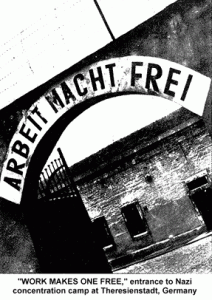“No one should have to work. Nearly all the evil in the world comes from working, or living in a world designed for work.”
So begins Bob Black’s essay on the Abolition of Work. Black goes on to say that not working doesn’t mean doing nothing, but instead, re-organizing your life around play. To play isn’t just goofing off; it involves creativity and meaningful contribution. If you were able to quit your job right now, after you recovered from work-induced exhaustion, you’d want to do something. It is finding this something, the joy we get from playing with a purpose that is at the heart of Black’s argument, and one I support and live wholeheartedly.

Work is the opposite of play: it is enslavement. At work we are under close supervision, told when we must come and go, what we must wear, when to eat, what kind of work to do and how much work to do. The workplace is one of strict disciplinary controls where we serve as forced labor, performing the same monotonous tasks over and over under the watchful eye of a manager whose job it is to give us more work so he or she can do less. Our free time is largely taken up by getting ready for work, commuting to and from work and recovering from work. What we call leisure is little more than a temporary escape where we try not to think about work.
With the exception of family-owned farms, cooperatives or the self-employed, our workplaces are organized around a 150 year-old military/industrial model. This is the pyramid-shaped command and control organization, dominated by a few senior level people, supported by paper-shuffling middle management, who keep a watchful eye over the mass of rank and file workers. There is little room for error, autonomy or direct communication with leadership. This is no different than the tightly disciplined and controlled environments of our prisons, schools or mental hospitals. So why do we continue to devote the majority of our lives to this misery?
It’s not about money. There are many ways, beside wage labor to contribute and be rewarded. I don’t believe there is dignity in work; there is dignity in creation, but not all creation is work. Creation can be recreation as Black asserts. That is, what we call hobbies and passions can take the place of work. Any kind of creative activity that you enjoy and that contributes value is play, not work. Play is our most basic human instinct and as children we become very skilled at it. Work is forced play. We have perverted something enjoyable and meaningful and robbed ourselves of our humanity for the sake of productivity.
Because our lives have become devoted to the consumption and production of commodities, we value productivity, efficiency and standardization. Which means that economies of scale tend to turn everything into soul-crushing, industrial systems. But the internet has eliminated most of the transactional costs needed to start and run a business, so more and more of us can create value from wherever we can connect with people. Work can become play again.
I agree that life has rules and you have to play by them. So does any game. And games, as Black points out, can have consequences. What I see as the crucial difference between work and play is that our intrinsic reward is in the experience of the activity itself, not in the money. If you love your job, it’s usually not because of what you are paid and in fact, people who are paid the least often love their jobs the most (teachers, volunteers, artists). So to free ourselves from the enslavement of work, we must each find the things we are most passionate about and play them to win in the high stakes game of life. If we seek excellence, our contributions will likely be noticed and rewarded.
For me, I enjoy designing and building projects (boutique hotels, schools, websites, new business models) as much as I enjoy teaching, gardening, running and writing. My classes are not workshops, but playshops. I don’t have workbooks, I have playbooks. This is not a game of semantics, it’s my attempt at a complete shift in the approach to learning, which at its heart, is all about play. When we engage purposefully in our instinctive desire to play, we create value and enjoyment for everyone. Isn’t this why we’re all working?